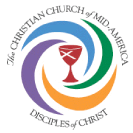The Christian Church (Disciples of Christ) of Mid-America
475 East Lockwood Avenue St. Louis, Missouri 63119
314/918-2515 Fax: 314/918-2529
www.mid-americadisciples.org
June 3, 2015
By now you have probably heard of the proposed changes coming to the Christian Church (Disciples of Christ) of Mid-America. You’ve heard about the ongoing financial needs and the structural changes. And, if you are like many of the people I’ve talked to about this transition, you may be asking “What does it mean to me?”
Last fall, as a part of my doctoral studies, I conducted a survey of pastors and lay leaders from around our region. I hoped to better understand what pastors and congregations need and want from our Regional Ministry Team. I found what pastors and lay leaders need from the Regional Staff is remarkably similar to what church members want and need from their pastoral leaders; support, prayer, guidance, and skill development.
In Ephesians 4:12, Paul explains that the many gifts of leadership in the church are given “to equip the saints for the work of ministry, for building up the body of Christ.” (NRSV) This is true, not only in the local congregation, but in all expressions of the church. Disciples of Christ historian Ronald Osborn notes; “Alexander Campbell thought of the great church as a ‘community of communities.’ He advocated a ‘general church organization’ which would give expression to this thought.” Just as every church leader has specific gifts and abilities which help to encourage and equip the body for ministry, our Regional Ministry team members have different gifts and abilities that equip and encourage the pastors and laity to participate in the ministries of the church.
The results of the surveys confirmed that both congregations and pastors long for a greater sense of connectedness with other churches and other pastors around the region and beyond. Historically, however, we have struggled to find a balance between the need for connection and the contextual nature of ministry. At times this tension has led to discord and the fracturing of relationships. At other times, however, it has brought unity and a sense of purpose to a diversified group of believers. Sometimes we long for the support that connection with other communities of faith provides. However, we know that each community brings with it a unique blend of challenges and opportunities.
I have been asked, “Why do we need the Region?” I believe that we need the Region for the same reason that we, as Christians, need the local church. We are meant to be part of the body of Christ. I believe that body extends beyond the local congregation. Osborn claims “the church operates on the principle of mutual consent within a common commitment.” What I believe we are being asked (I would say called) to do is to reaffirm our commitment to one another as Disciples. We are called to be a community of faith that extends beyond the boundaries of our sanctuary walls, beyond city limits, county lines, state borders, and even countries and continents. We are called to support one another as we strive to fulfill the ministries to which God is calling us.
During his inaugural address, during uncertain times here in the US and around the world, President John F. Kennedy urged us to think differently; “ask not what your country can do for you — ask what you can do for your country.” I believe the same is true in our churches, and in our region. Instead of asking what our region can do for us, we are called to ask what we can do to support our region. But, don’t take it from me, or even President Kennedy; Jesus told his disciples “whoever wishes to be great among you must be your servant, and whoever wishes to be first among you must be your slave.” (Matthew 20:26-27, NRSV)
I hope you will join me in asking, “How can I support, how can I serve, the church across our region, and around the world?” And, if I might be so bold, I would like to suggest some answers; prayer, finances, service, and involvement. We can and certainly should be in prayer for our regional leaders and for congregations around the region as we engage our local communities in life-giving ministry. We can and certainly should continue to provide financial support for the important connectional ministries of the region. We can and certainly should be involved in the various committees and ministries of the region. Because we are part of the body of Christ, and “If one member suffers, all suffer together with it; if one member is honored, all rejoice together with it.” (1 Corinthians 12: 26, NRSV)
Journeying together,
Rev. Alex Ruth
Marshfield Christian Church


